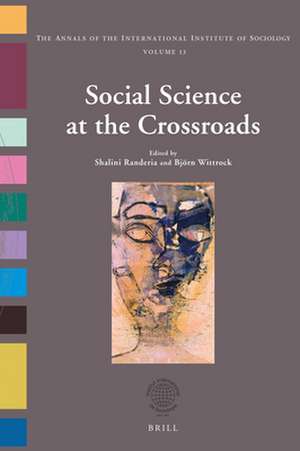Social Science at the Crossroads: Annals of the International Institute of Sociology, cartea 13
Shalini Randeria, Björn Wittrocken Limba Engleză Hardback – 5 iun 2019
Contributors are: Gustaf Arrhenius, Rajeev Bhargava, Craig Calhoun, Shmuel N. Eisenstadt, Yehuda Elkana, Raghavendra Gadagkar, Peter Hedström, Hans Joas, Hannes Klöpper, Ivan Krastev, Steven Lukes, Vinh-Kim Nguyen, Helga Nowotny, Shalini Randeria, Alan Ryan, Jyotirmaya Sharma, Christina Torén, Michel Wieviorka, Björn Wittrock, Petri Ylikoski.
Preț: 713.02 lei
Preț vechi: 869.55 lei
-18% Nou
Puncte Express: 1070
Preț estimativ în valută:
136.44€ • 142.74$ • 113.34£
136.44€ • 142.74$ • 113.34£
Carte indisponibilă temporar
Doresc să fiu notificat când acest titlu va fi disponibil:
Se trimite...
Preluare comenzi: 021 569.72.76
Specificații
ISBN-13: 9789004224261
ISBN-10: 9004224262
Pagini: 368
Dimensiuni: 155 x 235 x 28 mm
Greutate: 0.68 kg
Editura: Brill
Colecția Brill
Seria Annals of the International Institute of Sociology
ISBN-10: 9004224262
Pagini: 368
Dimensiuni: 155 x 235 x 28 mm
Greutate: 0.68 kg
Editura: Brill
Colecția Brill
Seria Annals of the International Institute of Sociology
Cuprins
Acknowledgements
Notes on Contributors
Introduction
Björn Wittrock and Shalini Randeria
1 What Can We Learn from Insect Societies?
Raghavendra Gadagkar
2 What Does it Mean to Be Human? Who Has the Last Word: Sociologists, Biologists, or Philosophers?
Alan Ryan
3 What Is It to Be Human? A Unified Model Suggests History will Have the Last Word
Christina Torén
4 Sociological Individualism
Peter Hedström and Petri Ylikoski
5 Norms as Social Facts
Steven Lukes
6 Political Secularity in India before Modern Secularism. A Tentative Overview
Rajeev Bhargava
7 Violence Affirmed. V.D. Savarkar and the Fear of Non-violence in Hindu Nationalist Thought
Jyotirmaya Sharma
8 The Future of Christianity
Hans Joas
9 From Local Universalism to Global Contextualism
Shmuel N. Eisenstadt
10 Democracy for the 21st Century
Gustaf Arrhenius
11 Democracy Disrupted. The Global Politics of Protest
Ivan Krastev
12 The Modern University in Its Contexts. Historical Transformations and Contemporary Reorientations
Björn Wittrock
13 Embracing Uncertainty
Helga Nowotny
14 Rethinking Biomedicine
Vinh-Kim Nguyen
15 Manifesto for the Social Sciences
Craig Calhoun and Michel Wieviorka
16 The University in the 21st Century: Teaching the New Enlightenment at the Dawn of the Digital Age
Yehuda Elkana and Hannes Klöpper
Index of Names
Index of Subjects
Notes on Contributors
Introduction
Björn Wittrock and Shalini Randeria
Part 1: Forms of Being
1 What Can We Learn from Insect Societies?
Raghavendra Gadagkar
2 What Does it Mean to Be Human? Who Has the Last Word: Sociologists, Biologists, or Philosophers?
Alan Ryan
3 What Is It to Be Human? A Unified Model Suggests History will Have the Last Word
Christina Torén
Part 2: Forms of Theorizing
4 Sociological Individualism
Peter Hedström and Petri Ylikoski
5 Norms as Social Facts
Steven Lukes
Part 3: Forms of Believing
6 Political Secularity in India before Modern Secularism. A Tentative Overview
Rajeev Bhargava
7 Violence Affirmed. V.D. Savarkar and the Fear of Non-violence in Hindu Nationalist Thought
Jyotirmaya Sharma
8 The Future of Christianity
Hans Joas
Part 4: Rethinking Democracy in Its Global Contexts
9 From Local Universalism to Global Contextualism
Shmuel N. Eisenstadt
10 Democracy for the 21st Century
Gustaf Arrhenius
11 Democracy Disrupted. The Global Politics of Protest
Ivan Krastev
Part 5: Rethinking Disciplinary Divides
12 The Modern University in Its Contexts. Historical Transformations and Contemporary Reorientations
Björn Wittrock
13 Embracing Uncertainty
Helga Nowotny
14 Rethinking Biomedicine
Vinh-Kim Nguyen
15 Manifesto for the Social Sciences
Craig Calhoun and Michel Wieviorka
Part 6: Rethinking the University
16 The University in the 21st Century: Teaching the New Enlightenment at the Dawn of the Digital Age
Yehuda Elkana and Hannes Klöpper
Index of Names
Index of Subjects
Notă biografică
Yehuda Elkana (1934-2012) was Professor of the History of Science, President and Rector of the Central European University (CEU) and before that Director of the Cohn Institute for the History and Philosophy of Science and Ideas at Tel Aviv University. He also held a position at Harvard University and was Professor in the Theory of Science at ETH in Zurich. He was a co-founder and editor of the scientific journal Science in Context. His research areas included the history of philosophy, the history and theory of science, higher education and the future of the university.
Shalini Randeria is Rector of the Institute for Human Sciences (IWM), Director of the Albert Hirschman Centre on Democracy and Professor at the Graduate Institute of International and Development Studies, Geneva. She has published widely on the anthropology of globalization, law, the state, social movements, as well as on post-coloniality and multiple modernities in India.
Björn Wittrock is Professor at Uppsala University and Principal of the Swedish Collegium for Advanced Study, Uppsala and member of the Royal Swedish Academy of Sciences, Academia Europaea and the American Academy of Arts and Sciences. He has published widely on the history of universities, of social science, the Axial Age and global history. Wittrock was President of IIS in the years 2005-2013.
Shalini Randeria is Rector of the Institute for Human Sciences (IWM), Director of the Albert Hirschman Centre on Democracy and Professor at the Graduate Institute of International and Development Studies, Geneva. She has published widely on the anthropology of globalization, law, the state, social movements, as well as on post-coloniality and multiple modernities in India.
Björn Wittrock is Professor at Uppsala University and Principal of the Swedish Collegium for Advanced Study, Uppsala and member of the Royal Swedish Academy of Sciences, Academia Europaea and the American Academy of Arts and Sciences. He has published widely on the history of universities, of social science, the Axial Age and global history. Wittrock was President of IIS in the years 2005-2013.







